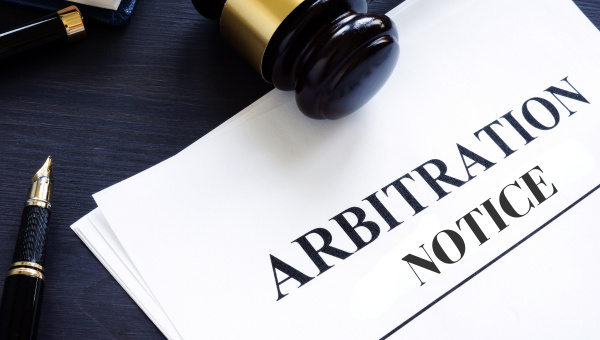Book A Consultation
Arbitration for Employment Disputes in the UK
Arbitration for employment disputes can be complex and stressful, leaving workers feeling overwhelmed and uncertain about their rights. Our comprehensive guide explores everything you need to know about resolving workplace conflicts through arbitration. We’ll break down the process, explain its benefits, and help you understand how this alternative dispute resolution method can protect your professional interests. Whether you’re dealing with salary disagreements, contract issues, or unfair treatment, arbitration offers a smart, efficient solution. Ready to learn more about how arbitration can help you resolve workplace challenges quickly and confidentially? Let’s dive into understanding what arbitration really means for employees.
If you have any questions or concerns, don’t hesitate to contact us. Our team is here to assist you every step of the way. Feel free to fill in a form so we can provide the necessary guidance tailored to your specific situation.
What is Arbitration in Employment Disputes
Imagine you’re having a tricky problem with your boss that seems impossible to fix. An independent arbitrator acts like a fair referee, listening carefully to both sides of the story. They help you and your employer find a solution that works for everyone.
The process is quicker and less stressful than a traditional tribunal, with some key benefits:
- Decisions are legally binding
- Conversations stay private
- Cheaper than going to court
- Faster resolution of workplace issues
For example, Sarah, a marketing manager, was having a disagreement about her bonus. Instead of a long, expensive court battle, she chose arbitration. The neutral arbitrator carefully reviewed her contract and her employer’s performance criteria, helping them reach a fair agreement in just a few weeks.
Another case involved Tom, a warehouse worker who felt unfairly treated. Arbitration allowed him to explain his side without the intimidation of a formal court setting.
Need help? Submit our lead form, and we’ll match you with SRA-regulated solicitors who specialise in employment disputes. Contact us today to explore your options.
When Should Arbitration Be Considered
When you’re facing challenging professional disagreements, this method offers a strategic solution that protects your interests. Issues like contract breaches, performance disputes, and collaborative misunderstandings often benefit from arbitration’s streamlined process.
Common scenarios suitable for arbitration include:
- Unresolved salary or bonus negotiations
- Intellectual property disagreements
- Commercial contract interpretation challenges
- Partnership and collaboration disputes
By choosing arbitration, you can:
- Maintain professional relationships
- Keep discussions confidential
- Avoid lengthy court proceedings
- Access specialised industry expertise
The process empowers you to address complex workplace challenges without public litigation, offering a pragmatic alternative to traditional legal routes. Skilled arbitrators help navigate interpersonal and commercial conflicts, ensuring fair and targeted resolutions that protect your professional standing.
Ready to resolve your dispute? Submit our lead form, and we’ll connect you with SRA-regulated solicitors who specialise in effective dispute resolution. Contact us today to explore your options.
How the Arbitration Process Works in the UK
When you’re facing a workplace challenge, the process begins with both parties agreeing to use arbitration and selecting an impartial arbitrator with specific industry expertise. You’ll jointly decide on the procedural rules, typically through
- mutual consultation
- written submissions
- evidence presentation
- informal hearing
For instance, a software developer might challenge unfair contract termination by choosing an arbitrator with technical employment expertise. The process ensures confidentiality and flexibility, allowing more relaxed communication compared to traditional court proceedings. Unlike formal tribunals, arbitration empowers you to present your case in a less intimidating environment, with the arbitrator carefully reviewing evidence and making a binding decision.
The approach offers significant advantages: faster resolution, reduced costs, and preserved professional relationships. Typical timescales range from weeks to a few months, depending on the dispute’s complexity.
Ready to resolve your dispute? Contact us, and we’ll match you with SRA-regulated solicitors who specialise in effective arbitration strategies.
Pros and Cons of Arbitration in Employment Disputes
Navigating workplace conflicts can be challenging, but arbitration offers a nuanced approach to resolving employment disputes. While it provides a streamlined alternative to traditional court proceedings, it’s not without its complexities. For instance, an IT professional challenging unfair dismissal might find arbitration both advantageous and limiting.
The process offers compelling benefits:
- faster resolution compared to court cases
- significantly lower legal expenses
- complete confidentiality
- more flexible hearing procedures
- reduced emotional stress
However, employees must carefully consider potential drawbacks. Arbitration typically involves
- restricted appeal rights
- limited evidence discovery
- potential bias towards employers
- typically lower compensation awards
- mandatory agreements that might compromise individual rights
Consider a scenario where a marketing executive disputes a contract termination. Arbitration could resolve the issue quickly and privately, preserving professional relationships while providing a less intimidating environment than a formal court hearing.
To learn more about employment arbitration and its applications, visit the ACAS Arbitration Guide for impartial advice on this resolution method.
Maximum Compensation and Enforcement in Arbitration Rulings
Enforcing arbitration decisions requires careful navigation through legal procedures and financial complexities. Compensation awards vary significantly depending on case specifics, with payout limits typically negotiated during initial arbitration agreements. When an arbitrator reaches a decision, the ruling becomes legally binding, triggering a structured enforcement process.
Key steps include:
- Formal documentation of the arbitration award
- Potential court registration for official endorsement
- Direct communication with the responsible party
- Exploring financial recovery mechanisms
Real-world scenarios demonstrate the nuanced enforcement landscape. A software developer successfully challenged unfair dismissal, securing compensation through systematic legal channels. Similarly, a marketing manager resolved a bonus dispute by leveraging arbitration's efficient resolution framework.
Compensation recovery can be challenging, influenced by factors like the respondent's financial capacity and jurisdictional intricacies. Complex cases might require specialised legal support to navigate potential obstacles and ensure fair resolution.
Want expert guidance? Submit our lead form, and we'll match you with SRA-regulated solicitors who specialise in effective arbitration enforcement. Contact us today to explore your options.
Related Articles

Maternity Pay for the Self-Employed: Explained
Maternity Pay For Self Employed Eligibility Criteria For Maternity Allowance How Much Maternity Pay Can Self-Employed Women Receive How Many Weeks Does Maternity Allowance Cover Is Maternity Pay For Self Employed Taxable How To Apply For Maternity Allowance Using...
Join Our Newsletter
Top Reasons to Choose Voluntary Redundancy
Gaining Financial Benefits From Voluntary Redundancy Opportunity For Career Change Taking Control Of Your Future Creating Work Life Balance Escape From Unsatisfying Roles Book A ConsultationGaining Financial Benefits from Voluntary Redundancy When your company...
How to Document Harassment at Work Legally
Maintain A Detailed Incident Log Collect And Organise Supporting Evidence Why Documenting Minor Incidents Matters Seek Corroboration From Witnesses Book A ConsultationMaintain a Detailed Incident Log When dealing with workplace harassment, your documentation becomes...
Holiday Entitlement While on Maternity Leave
What Is Holiday Entitlement During Maternity Leave? Can Holiday Be Used Instead Of Extending Maternity Leave? Do Public Holidays Count Towards Accrued Entitlement? How To Calculate Holiday Accrual During Maternity Leave When Can Accrued Holiday Be Taken? Carrying Over...
Taking Legal Action for Pregnancy Discrimination
What Is Pregnancy Discrimination At Work Taking Legal Action Against Pregnancy Discrimination Recognising Examples Of Pregnancy Discrimination At Work Steps To Take If You Experience Pregnancy Discrimination How Employers Can Avoid Pregnancy Discrimination Claims Book...









